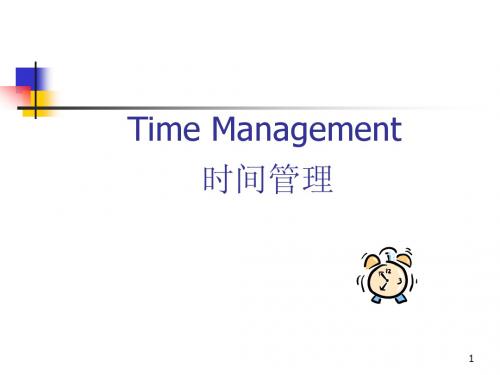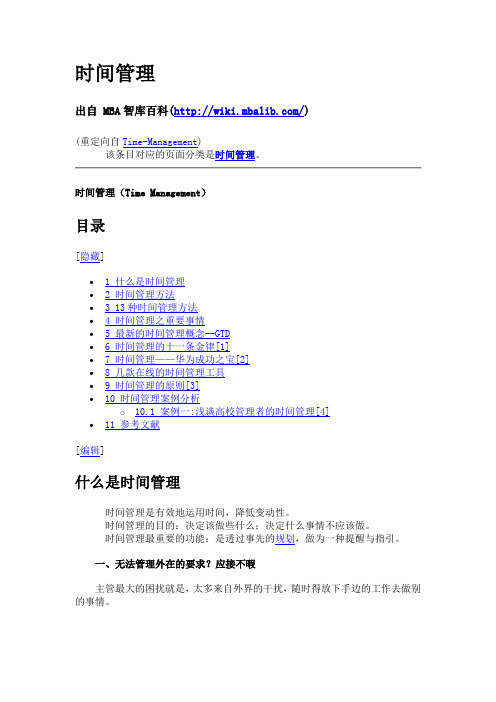time management
02-Time Management

The basic of time management
时间管理的基本原理
Specific implantation of time management
时间管理的具体实施
为
正文 . 第一章-Text - chapter 1-Why time management
什
么
需
1
Time is the only resource we have that is fair to everyone
要 时
做好时间管理,是实现人生规划的保证
间 管
理
Everyone has their own dream, or have their own ideal life goals. In professional terms, have your own life plan. Life planning is nothing more than wanting to be able to do what you want to do, be who you want to be, and achieve the goals you set.
最不受重视又是最值得惋惜的?
Nothing can be done without it.没有它,
什么事情都做不成。 ——Voltaire-伏尔泰
时 间 与 时 间 管 理 概 述
LOGO
时
正文 . 第二章-Text - chapter 2-Overview of time and time management
self-management
管理的对象不是时间,而是每一个使用时间的人,其本质就是自我管理
第 12 页
LOGO
Time Management时间管理

优先等级设定
有效沟通
给予、接受 反馈
冲突管理
时间对于我们意味着什 么? 我们的困境在哪里? 时间管理的正确含义? 做正确的事--目标与 计划 正确地做事--优先计 划管理
优先设定VS 时间管理
个人发展 行动计划
如果用一个词来描述你过去的 工作、生活状态,你最想用什么 词?
时间计划表
工作 起止时间 使用时间 优先顺序 备注
提高效率
管理自己
) 果断 )合理计划 ) 跟进计划 ) 专注力
管理他人
) 沟通
) 团队协作 ) 寻求帮助 ……
) 整合工作内容
) 划分出能自主支配的整块时间
) 利用零碎时间 ) 各时段工作状态 ) 守时 ) 整洁的工作环境 ) 避免拖延, 立刻去做
在开始工作之前,把所有你要用的东西准备好:避免工 作过程中出现不必要的停顿。 别让干扰和突然冒出来的想法打断你的工作。先把他们 记下来,回头再处理。
减少无谓的时间浪费
“ -”
帕金森定律:工作膨胀。事情 增加是为了填满完成工作所需 的多余时间
理解时间的规律:具体表现、建议
你在某件事情上所花的时间和你能用的时间成正比。
紧急:
这件事现在不做行不行? 会不会产生严重影响? 改天再做可以吗?
与上级沟通确认
练习:写出一天的工作内容并 设定优先次序
紧急 重 要 不 重 要
时间管理距阵
不紧急
练习:时间管理优化
将自己制定的优先顺序和小组分享 小组成为给出建议,评价自我认定的优先顺序是否合理 小组在每次轮换中
谢谢大家!
Time management

Another way to describe time management
• 以年为单位的时间管理 年 • To the unit in time management • 以天为单位的时间管理 天 • To-day management unit of time • 以小时 小时为单位的时间管理 小时 • In hours as a unit of Time Management
Three steps
• the first step in efficient time management is to organize the workspace or home. Even if one's schedule is well-ordered, but the office and filing system are a disaster, time will be wasted trying to work efficiently in a disorderly place.
Stephen Covey’s time management matrix
• 美国管理学家科维(Covey)提出的时间管理理 科维( 科维 ) 论(时间四象限法):把工作按重要( Important ) 和紧急( Urgent )两个不同的程度进行了划分, 大体分为4个象限(Four Quadrants ): • A.既紧急又重要(如客户投诉、即将到期的任务、 财务危机等) • B.重要但不紧急(如建立人际关系、人员培训、 制订防范措施等) • C.紧急但不重要(如电话铃声、不速之客、部门 会议等) • D.既不紧急也不重要(如上网、闲谈、邮件、写 博客等)
timemanagement

Time ManagementIntroductionIn today’s fast-paced world, time management has become a crucial skill for everyone. The ability to efficiently manage our time allows us to be more productive, reduce stress, and achieve our goals. This document aims to provide an overview of time management and offer practical tips and strategies to help individuals improve their time management skills.Why is Time Management Important?Time is a finite resource, and once it’s gone, we can never get it back. Effective time management ensures that we make the most of our limited time. Here are some key reasons why time management is crucial:1.Increase Productivity: Effective time managementhelps us work smarter, prioritize tasks, and avoidunnecessary distractions. By focusing on important tasks and eliminating time-wasting activities, we can accomplish more in less time.2.Reduce Stress: Poor time management often leads tofeeling overwhelmed and stressed. By organizing our tasks, setting realistic goals, and planning ahead, we caneffectively manage our workload and minimize stress levels.3.Improved Decision-making: Time managementallows us to allocate our time based on the importance and urgency of tasks. This helps us make informed decisionsabout what needs to be done first and what can bepostponed.4.Goal Achievement: Proper time management helpsus set clear goals and work towards them in a systematic manner. It helps us stay focused, motivated, and on track to achieve our objectives.Time Management TechniquesThere are various time management techniques that individuals can employ to enhance their productivity. Here are some popular techniques:1.Prioritize Tasks: Start by identifying and prioritizingthe most important tasks. Use a to-do list or taskmanagement tool to keep track of tasks and establish their urgency and importance. Focus on completing the high-priority tasks first.2.Set SMART Goals: SMART stands for Specific,Measurable, Achievable, Relevant, and Time-bound. When setting goals, ensure they are clear, quantifiable, realistic, relevant, and have a deadline. This helps create a sense of urgency and provides a clear roadmap for achieving thegoals.3.Create a Schedule: Develop a daily or weeklyschedule that outlines the tasks and activities to beaccomplished. Allocate specific time blocks for differentactivities, include breaks, and stick to the schedule as much as possible.4.Avoid Procrastination: Procrastination is a commontime management challenge. Overcome it by breaking tasks into smaller, manageable chunks, setting deadlines, andusing tools like a Pomodoro timer to work in short bursts of focused time.5.Delegate and Outsource: Learn to delegate tasks thatcan be done by others to free up your time for moreimportant responsibilities. If possible, outsource tasks that are not within your expertise, thereby saving time andenergy.6.Minimize Distractions: Identify and eliminate orminimize distractions that hinder productivity. Put awayyour phone, close unnecessary browser tabs, and create a quiet and organized workspace to minimize interruptions.7.Practice Time Blocking: Time blocking involvesscheduling specific time blocks for focused work on specific tasks. This helps create dedicated periods for concentrated effort and reduces the chance of multitasking.8.Lea rn to Say No: It’s important to recognize ourlimits and not overcommit ourselves. Learn to say no totasks or activities that will overload your schedule orhinder your progress towards your goals.ConclusionEffective time management is a valuable skill that can significantly enhance productivity and overall well-being. By implementing the techniques mentioned in this document, individuals can improve their time management skills andexperience the positive benefits in their personal and professional lives. Remember, time is a precious resource, and it’s up to us to make the most of it. Start managing your time efficiently today!。
管理时间英语作文

管理时间英语作文Time Management。
Time is a precious resource that we all have in equal measure. However, how we choose to use it can make a significant difference in our lives. Effective time management is essential to achieving our goals, reducing stress, and improving our overall quality of life.To manage our time effectively, we need to set clear goals and prioritize our tasks. We should identify what is most important and focus on those tasks first. We should also learn to say no to tasks that are not essential or do not align with our goals.Another critical aspect of time management is planning. We should create a schedule or to-do list and stick to it. We can use tools such as calendars, planners, or apps to help us stay organized and on track.Procrastination is a significant barrier to effective time management. We should avoid putting off tasks untilthe last minute and instead tackle them as soon as possible. We can break down larger tasks into smaller, more manageable ones to make them less daunting.Distractions are also a common obstacle to effective time management. We should minimize distractions by turning off our phones, closing unnecessary tabs on our computers, and finding a quiet workspace.Finally, we should take breaks and allow ourselves time to recharge. Taking breaks can help us stay focused and productive in the long run.In conclusion, effective time management is crucial to achieving our goals and living a fulfilling life. Bysetting clear goals, prioritizing tasks, planning, avoiding procrastination and distractions, and taking breaks, we can make the most of our time and achieve success.。
Time management

时间管理的概念
时间本身不是问题;
时间管理的问题本身不在于时间,而是在于面对时间
而进行的“自我管理”。
自我管理即是改变习惯,令自己更有效率,更有效果。
把事情很快的做完,叫效率; 把事情很快又很对的做完,叫效果。
7
时间管理的障碍
我的时间安排得挺好,我是一个有序的人 时间管理有什么用,计划赶不上变化 时间掌握在别人手中 时间管理太麻烦 习惯不同,我就这样,不好改 „„„„„„„„„„„„„„
时间控制
23
培养说“不”的能力
说“不”应该有礼貌 要给对方清晰的解释 给对方另外的选择和建议 懂得在适当时候说“不” 建立一套方法和技巧减少打扰 缩短必须要做的事所花的时间 抗拒拖延 求取生活和工作平衡
如果你从来不懂得拒绝工作,导致工作量超出负荷时 你的工作品质势必会大受影响!
正确的时间配置 Put first things first
重要的事情着重在“Plan” “Plan”着重在“Do”
“Do”着重在“Check” “Check”着重在“Action” 重要的事情要逐渐地交给信任的部属,这叫“授权” 大石头
小沙子 水
27
总结
什么是时间杀手?
28
时间杀手的分类
(2). 对时间管理方面,你得到哪些启发?
33
时间是串起过去、现在及未来无数事件的连续线
34
有形 ( 自觉的) 接听电话 打电话 会议 打扰 官僚作风 沟通不足 办公室政治 资源不足 阅读文件及邮件 交通堵塞
29
时间杀手的分类
无形的 ( 不自觉)
1. 欠缺周详计划 2. 不懂分辨缓急先后 3. 过分注重细节 4. 犹疑不决 5. 不懂得说“不” 6. 拖延 7. 善忘 8. 不懂授权 9. 欠缺组织 10. 健康欠佳
time management

Time Management
浪费时间的原因有主观和客观两大方面。
主观原因,是一切的根源。
1. 2. 3. 4. 5. 6. 7. 8. 9. 做事目标不明确。 作风拖拉。 缺乏优先顺序,抓不住重点。 过于注重细节。 做事有头无尾。 没有条理,不简洁,简单的事情复杂化。 事必躬亲,不懂得授权。 不会拒绝别人的请求。 消极思考。
Time Management
麦肯锡30秒电梯理论
麦肯锡公司曾经得到过一次沉痛的教训:该公司 曾经为一家重要的大客户做咨询。咨询结束的时 候,麦肯锡的项目负责人在电梯间里遇见了对方 的董事长,该董事长问麦肯锡的项目负责人:“ 你能不能说一下现在的结果呢?”由于该项目负 责人没有准备,而且即使有准备,也无法在电梯 从30层到1层的30秒钟内把结果说清楚。最终,麦 肯锡失去了这一重要客户。从此,麦肯锡要求公 司员工凡事要在最短的时间内把结果表达清楚, 凡事要直奔主题、直奔结果。麦肯锡认为,一般 情况下人们最多记得住一二三,记不住四五六, 所以凡事要归纳在3条以内。这就是如今在商界流 传甚广的“30秒钟电梯理论”或称“电梯演讲” 。
计划-帮你实现目标
z z z z z z 工作日志 每日计划 每周计划 每月计划 季度计划 年计划
Time Management
工作日志
To Do List
优先度 工作内容 参考信息 起始时间 完成时间 完成检查
Time Management
每日计划
Daily Plan
时间
8:30 9:30 10:30 11:30 12:30 13:30 14:30
Time Management
一些思考
z 培养自己独立工作和解决问题的能力
z 不断更新自己的知识,信息与技巧
时间管理(Time-Management)

时间管理出自 MBA智库百科(/)(重定向自Time-Management)该条目对应的页面分类是时间管理。
时间管理(Time Management)目录[隐藏]∙ 1 什么是时间管理∙ 2 时间管理方法∙ 3 13种时间管理方法∙ 4 时间管理之重要事情∙ 5 最新的时间管理概念--GTD∙ 6 时间管理的十一条金律[1]∙7 时间管理——华为成功之宝[2]∙8 几款在线的时间管理工具∙9 时间管理的原则[3]∙10 时间管理案例分析o10.1 案例一:浅谈高校管理者的时间管理[4]∙11 参考文献[编辑]什么是时间管理时间管理是有效地运用时间,降低变动性。
时间管理的目的:决定该做些什么;决定什么事情不应该做。
时间管理最重要的功能:是透过事先的规划,做为一种提醒与指引。
一、无法管理外在的要求?应接不暇主管最大的困扰就是,太多来自外界的干扰,随时得放下手边的工作去做别的事情。
担任主管的责任之一就是集合多人的努力,共同完成一份工作。
换句话说,主管的工作有很大的一部份需要与别人互动,外界的干扰是主管工作的一部份。
你可以排定某些时段做为你的工作空挡,当有人临时找你需要讨论事情时,告诉他,你这会儿忙着呢,不急的话儿,在你的空挡时间再来详谈。
时间管理发展得很快,第一代是建立备忘录;第二代就需要事先的计划和准备;第三代会根据你对任务的理解排列优先顺序。
到了第四代,就是分工合作的授权管理。
二、做事没有方法?阅历我们常运用自己所熟悉或直觉想到的方法做事,但事实上,这并不是最有效率的方法。
完成一件事情,可以有许多方法,关键在于你能否找出最快速的方法。
不要毫不考虑的就直接做了,先花几分钟的时间衡量一下,有什么方法可以更有效率的完成事情?三、周围干扰因素?自控周围众多干扰因素,是时间流逝的致命杀手,嘈杂声、杂志、零食、报纸、美容品、温度、安全感、方向感、氛围、性欲、压力、烟瘾、联想、健康状况,都是诸多的影响因素。
[编辑]时间管理方法(一)、计划管理关于计划,有日计划、周计划、月计划、季度计划、年度计划。
- 1、下载文档前请自行甄别文档内容的完整性,平台不提供额外的编辑、内容补充、找答案等附加服务。
- 2、"仅部分预览"的文档,不可在线预览部分如存在完整性等问题,可反馈申请退款(可完整预览的文档不适用该条件!)。
- 3、如文档侵犯您的权益,请联系客服反馈,我们会尽快为您处理(人工客服工作时间:9:00-18:30)。
Page 18 of 62
克服1.成本/效益分析法
成本 • • • • • • ... ... ... ... ... ... • • • • • • ... ... ... ... ... ... 好處
日月光 GRP團隊 時間管理 Rev B. 06/09/2002
Page 19 of 62
克服2.思維習慣的改變
Page 23 of 62
如何提高工作效率
如何提高工作效率
1.了解自己每天工作時段的特性, 善用之. 2.以 PDCA 分佈週一到週五的工作性質. 3.保持良好的體力; 養成運動的習慣 4.身心均衡地發展; 培養良好的嗜好
日月光 GRP團隊 時間管理 Rev B. 06/09/2002
Page 25 of 62
GRP Rev B. 06/09/2002
80 60 40 20 0
18
專
12
專
12
專
專 案 一 二 案
專 案 三
專 案 四
專 案 五
專 案 六
專 案 七
專 案 八
案 九 十
案
140 120 100 80 60 40 20 0
125 100 80 64 48 36 27
18
學
12
學
12
學
學 習 一 二 習
1.工作時段分配法則
早上 活力充沛, 衝勁 與勇氣兼俱 (Do) 1.發球: EMail 2.電話敲定事情 / 做事情 3.給 Leader 方 向/ 畫架構 4.執行進行中專 案
日月光 GRP團隊 時間管理 Rev B. 06/09/2002
中午 13:00~15:00 思考遲頓, 適合 散心, 放鬆 (Check) 1.面對面 Follow Up 2.Go Around 3.溝通與協調
Page 22 of 62
Conclusions: 時間管理架構
緊迫的事 1.兵貴速戰速決 2.快刀斬亂麻 不緊迫的事
重要的事
1.決勝於廟堂 之上 2.灌能 均 衡 1.怡情養性 2.輕鬆一下
不重要的事
1.捨得 2.勇於拒絕 3.交待
日月光 GRP團隊 時間管理 Rev B. 06/09/2002
日月光 GRP團隊 時間管理 Rev B. 06/09/2002
Page 10 of 62
時間管理的架構
請排出正確的行事優先順序
緊迫的事 1 st 急 不緊迫的事 2 nd 重
重要的事
? ?
A B
C D
? ?
不重要的事
3 rd 輕
4 th 緩
日月光 GRP團隊 時間管理 Rev B. 06/09/2002
• 這件事令人感到為難, 但是它非做不可, 因此我將立即做完它, 以便儘早忘掉它. • 養成速戰速決的習慣 • 將事情切成好幾塊小塊任務, 快速地完成 每一塊的任務 • 完成最關鍵的部份, 讓事情看起來像做完 80% 一般
日月光 GRP團隊 時間管理 Rev B. 06/09/2002
Page 20 of 62
Page 12 of 62
正確的行事優先順序
緊迫的事 1 st 急 3 rd 輕 不緊迫的事 2 nd 重 4 th 緩
重要的事
不重要的事
日月光 GRP團隊 時間管理 Rev B. 06/09/2002
Page 13 of 62
緊迫的事
設備故障,生產停擺 重傷害急救 重要的事 員工產生肢體衝突 顧客抱怨 停電 有些電話 有些不速之客到訪 不重要的事 有些會議之出列席 有些無謂的請託 有些臨時的邀約
日月光 GRP團隊 時間管理 Rev B. 06/09/2002
Page 27 of 62
如何管理你的EMail
葛洛夫: 你的時間是不是被 Email 切成零零碎碎的片段? 集中處理它.
先問自己以下這幾個問題
1.你一天花多少時間在看 Email? 2.你進 Email 會不會看小品? 3.你看Email 的時間是連續的, 還是片斷的? 4.你的Email 有沒有做分類? 5.你回信時是邊看邊回, 還是分類後集中回 信? 6.你進 Email 信箱, 是先看信還是先發信?
– 把事情很快地做完, 叫做效率 – 把事情很快又很對地做完, 叫做效能
• 時間管理就是事前的規劃或長期的計劃
日月光 GRP團隊 時間管理 Rev B. 06/09/2002
Page 6 of 62
人, 為何安於現狀?
• 為何你我都不滿意現狀, 但是卻安於現狀
1.無奈 2.不確定改變之後會更好 3.因為現狀是你我最熟悉的
陷阱四: 有求必應
• 會花太多時間, 時間不夠會犧第二項 受人尊敬重要, 還是受人歡迎重要 • 不好意思拒絕請託的原因
– – – – 接納請託比拒絕請託容易 擔心觸怒請託者 想要做廣受愛戴之好人 不知如何拒絕他人之請託
• 每個人都有一個好朋友, 叫 “施小惠”, 可以適當地拒絕.
日月光 GRP團隊 時間管理 Rev B. 06/09/2002
不重要的事
1.捨得 2.勇於拒絕 3.交待
日月光 GRP團隊 時間管理 Rev B. 06/09/2002
Page 34 of 62
花時間在計劃上才是 最節省時間的作法
不 好 耗用時間
A C D P 好 耗用時間
日月光 GRP團隊 時間管理 Rev B. 06/09/2002
Page 35 of 62
學 習 三
學 習 四
學 習 五
學 習 六
學 習 七
學 習 八
習 九 十
習
140 120 100 80 60 40 20 0
125 100 80 64 48 36 27
18
生
12
Page 36 of 62
80/20原理意示圖
20% 成效
瑣碎的 多數事物
80% 時間 80% 成效
重要的 少數事物
20% 時間
日月光 GRP團隊 時間管理 Rev B. 06/09/2002
Page 37 of 62
目標金字塔
長程目標 年目標 季目標 月目標 週目標 日目標
日月光 GRP團隊 時間管理 Rev B. 06/09/2002
日月光 GRP團隊 時間管理 Rev B. 06/09/2002
Page 15 of 62
不合理的時間配置
I. 45% 處理危機 II 5% IV 15% II. 35%
日月光 GRP團隊 時間管理 Rev B. 06/09/2002
Page 16 of 62
明智的時間配置
I
1.重要的事情著重在 Plan Plan 著重在 Do Do 著重在 Check Check 著重在 Action 2.重要的事情要逐漸地交給 信任的部屬, 這叫 “灌能”
下午 冷靜, 溝通 (Action, Plan)
晚上 Relax, 人文, Thinking
1.思考問題 1.花 1 小時寫作 2.寫計劃/ Update Follow up進度 (1hr) 3.Update/Modify 進行中專案
Page 26 of 62
2.每週工作性質分配法則
禮拜一二 活力充沛, 衝勁 與勇氣兼俱 (Do) 1.大型專案丟球 2.組內專案丟球 3.給予組員做事 方向/做事重點 4.創造議題 禮拜三四五 禮拜六日 備註 思考遲頓, 放鬆, 冷靜, 思考 溝通 (Action, Plan) (Check) 1.Follow Up 一 二所丟的球 2.調整, Update 計劃 3.議題收尾 4.傾聽溝通 1.想想目的是什 麼? 意義何在? 2.有沒有辦法提 昇自己的價值? 3.計劃/ 規劃
Page 8 of 62
有三片木條, 如何將它們圍成封閉三角形
2 cm 10 cm 4 cm
日月光 GRP團隊 時間管理 Rev B. 06/09/2002
Page 9 of 62
你可知道為何會畫不出來?
• 因為你跳不出原來的思維習慣 • 但是假設你畫了出來. 恭喜你, 你可以用 新的角度去思考一個舊有的問題. • 改變時間管理的第一步, 從你自覺需要時 間管理開始
• 當你開始不滿於現狀時, 表示會有新的事 物發生在你的身上…但是要用對 “新的 思考方式”
日月光 GRP團隊 時間管理 Rev B. 06/09/2002
Page 7 of 62
請架設一座橋,使A至B 距離最短, 但是橋不可歪斜
300 公尺 B 100 公尺
河水
A
日月光 GRP團隊 時間管理 Rev B. 06/09/2002
*
時 間 管 理 II
日月光集團 GRP 菁英團隊 管理課程
Rev.: B; 06/09/2002 WorkShop 時間: 2.5 小時
請閉目一分鐘思考這個問題
如果您的餘生只剩下三天, 您會做那三件事情?
日月光 GRP團隊 時間管理 Rev B. 06/09/2002
Page 3 of 62
時間管理是什麼?
時間管理不是什麼?
• 時間本身不是問題. 因為每個人每天所擁 有的時間都是一般地多 • 所以時間管理的問題本身不在於時間, 而 是在於自己如何善用及分配你自己的時 間
日月光 GRP團隊 時間管理 Rev B. 06/09/2002
Page 5 of 62
時間管理是什麼?
• 時間管理就是自我管理 • 自我管理即是改變習慣, 以令自己更富績 效, 更富效能
陷阱三: 事必親躬
• 韓非子.八經
– 下君,盡已之能 – 中君,盡人之力 – 上君,盡人之智
• 諸葛亮凡事必親躬, 後來過勞而死. • 為何事必親躬?
– 因為怕部屬取代 – 不放心部屬, 不信任部屬 – 要求標準過高
